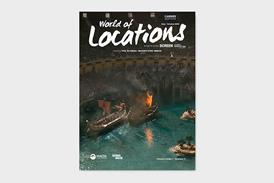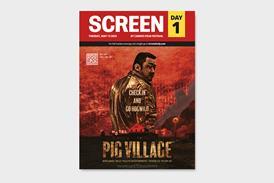Dir. Pjer Zalica. Bosnia-Herzegovina/Austria/Turkey/France, 2003. 105 min.
Competing in Locarno and the opening attraction at this year's Sarajevo Film Festival, Pjer Zalica's debut feature displays all the boisterous energy verging on the vulgar, the black sense of humour but also the tragic pathos which have become the trademarks of the better products coming from that part of the world. Zalica, who has behind him a decade of grim documentaries on Balkan wars and their outcome, crosses over into fiction with a satirical depiction of Bosnia two years after the cold peace, done in a much lighter mood, though tragedy lurks darkly in it behind every twisted smile. Taking place in a small town, Teshanj, that has to clean itself up overnight if it wishes to be adopted by President Clinton, when he comes to visit, this is naturally intended as an allegory for the resilience of a country despite being riddled by corruption, crime, ethnic intolerance and deeply scarred by a war that it is not prepared to forget as quickly as the international community would like it to. For Balkan sections in any festival around the world, this is a must, and in the right hands, it could find its place somewhere on the border between art-house and politically inclined distribution.
The spirit of the picture is already proclaimed in the opening scene: an older man is having a drink in his own garden with another person who turns out to be not only his son but his late son, killed in the war. This father, Zaim (Diklic) once the chief of police in town, refuses to believe his son dead and is willing to go to any lengths to prove he is right. This provides one of the two threads the script will try to follow, in a rather disorderly manner, for the rest of the film. The other thread being the news that President Clinton, during his celebrated visit to Bosnia, is interested to come into Teshanj, and take it under his personal protection, but only if it is certified to be worthy of such an honour.
This means the mayor has to destroy all evidence that would reveal the shenanigans used to run the place, the new chief of police would have to desist, at least for a while, from his profitable participation in the traffic of alcohol, cigarettes, prostitutes and illegal labour, and the local population will have to demonstrate brotherly feelings towards their Serb neighbours, despite the horrific memories of a war that is barely over. Which is easier said than done, for the anarchic nature of the people in town, their persistent trust only in themselves and their wiles, their tradition of always finding ways around regulations and authorities to achieve their purposes, will always interfere with any semblance of law and order, of coexistence and democracy.
Though it does not bring many new elements, political or formal, to the increasing number of films dealing with this situation, the plot may not be particularly well organised and the characters are certainly broad, which is par for the course in such instances, the picture is nevertheless making its points through small, incisive samples of absurd reality distributed all over the place.
A Serb fireman asks a Bosnian one, who obviously hates his guts, to buy some pampers for him because they are not available on his side of the border and the Bosnian readily agrees. Mutual ethnic defiance and mistrust is put on hold for a brief while, when the Bosnian mayor asks the Serb one from across the border to lend him some of his people for an afternoon, to pretend for the benefit of UN observers that they are willing to come back to the homes they once abandoned, something they would not dream of doing in real life, given the fierce animosity displayed by their former neighbours.
And for coarse humour - how about two prostitutes servicing side by side the chief of police and the head racketeer in town, while discussing everyday matters between them' At the same time, mindless violence ignites at the slightest excuse, the pain and the anger of the past are authentic, and thanks to Diklic's inspired performance as the bereaved father, his character reaches truly tragic dimensions in the third act. Shot digitally, the film has the rough and tough feeling typical to Balkan cinema tradition, and the final plea made by one of the characters, asking the spirit of the departed son to stay away for a while and to stop breathing down his family's neck puts the entire message in a nutshell. Give the present a break.
Prod. Co: Refresh Productions, Sarajevo, with Novotny&Novotny Film Produktion, Austria, RTV FBIH, Bosnia-Herzegovina, Istanbul Film Service, Cine-Sud Promotion, France.
Prod: Ademir Kenovic
Int. Sales: Refresh Productions
Scr: Pjer Zalica
Cinematography: Mirsad Herovic
Ed: Almir Kenovic
Prod. Des: Kemal Hrustanovic
Costumes: Amela Vilic
Music: Sasha Losic
Cast: Enis Beslagic, Bogdan Dilic, Sasha Petrovic, Izudin Bajrovic, Jasna Zalica, Senad Basic, Admir Glamotchak, Emir Hadzihafizbegovic, Feda Stukan, Hubert Kramar, Ana Vilenica





























No comments yet